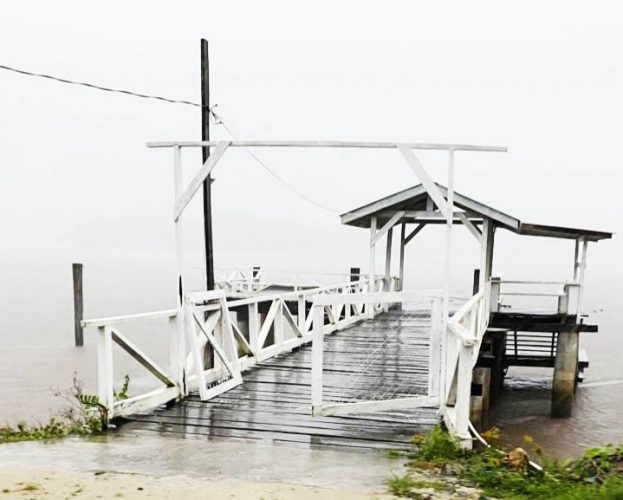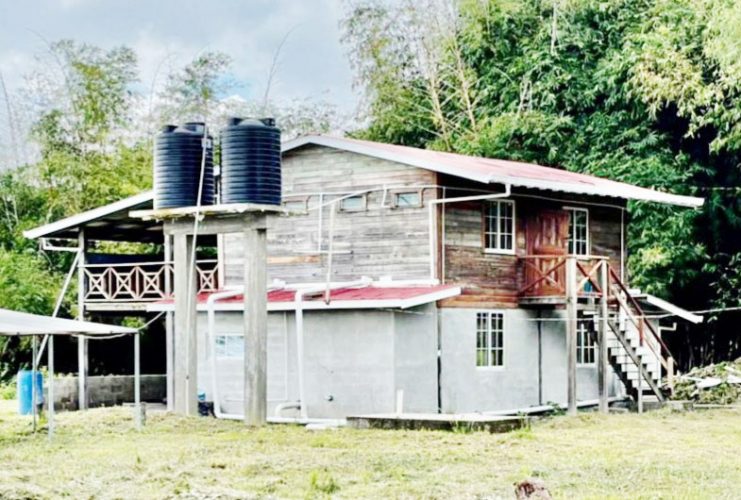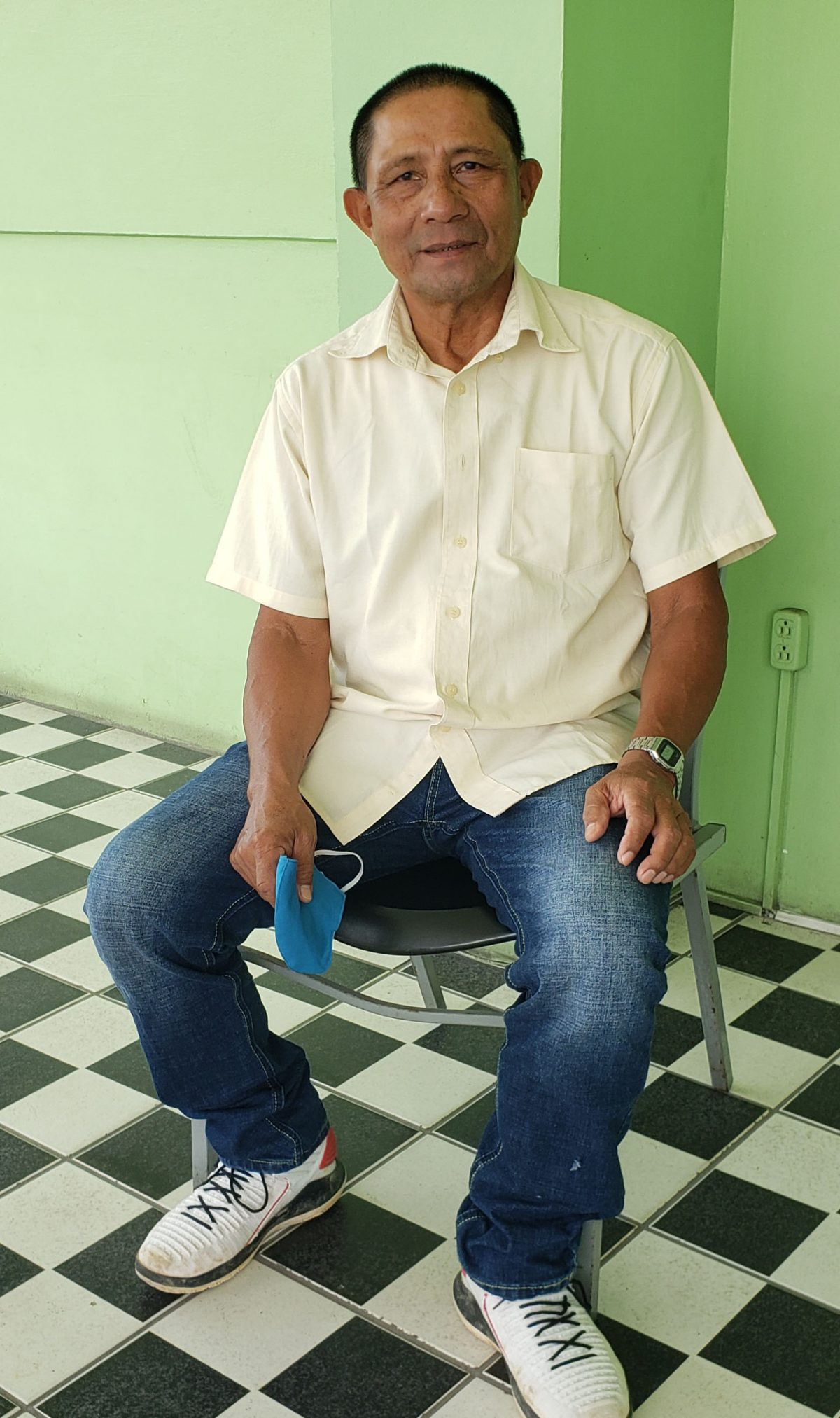Although his recent term as toshao of Orealla-Siparuta, was far from smooth sailing, Carl Peneux, 64, is hopeful that his successor can build on the groundwork that he has laid for the development of the Corentyne River indigenous communities that have a population of about 1,700 of mainly Lokono (Arawak) and Warrau peoples.
While his tenure as toshao put him in the public eye, Peneux has spent most of his life as an educator and he is hopeful that the new village council follows up on the petition his council sent to the government for a secondary school to be built in Orealla because of the prohibitive costs of transportation, boarding and lodging for students in the towns and city.
The secondary department at Orealla Primary does not cater for more than five or six subjects at the Caribbean Secondary Educa-tion Certificate (CSEC) examinations. It does not have the staff or facilities to teach the children.


“I was the man who got the secondary department started in 2006 when I was the senior master there. When we started that programme, we were getting help from the Project Trust teachers, young people just out of high school from England and Wales who would be sponsored to come to Guyana and other Common-wealth countries to teach after writing their GCE Advanced Level examinations. That programme ended two years ago. I ran the CSEC programme until I retired from teaching in 2011. We were trying to do physical education/sports as a subject. We do not have the facilities,” he told Stabroek Weekend.
Noting that a few children who achieved high scores at the National Grade Six examinations were given scholarships to secondary schools in Georgetown, he said, “Some [fell] short and had to return home. Quite a number go to Skeldon Line Path or Skeldon High in Corriverton or at Tagore High School at Number 63 Village. Some drop out. Some finish school with one or two CSEC subjects. So it is not working for us. It is time the children get their secondary education right here in Orealla under their parents’ supervision and guidance.”
Peneux himself had to leave Orealla to get his secondary education. He attended North Georgetown and South Georgetown secondary schools. He wrote the General Certificate of Education (GCE) Ordinary Level subjects at South Georgetown and obtained several passes.
Returning to Orealla
Unlike many of his counterparts who obtained hinterland scholarships and found employment and further their studies outside of their villages, Peneux returned to Orealla after he had completed his secondary education.
“When I wrote my GCE English Language composition, the subject was on ‘If you were given one million dollars, how are you going to spend it’”, Peneaux said, “I wrote about things I would do to develop Orealla. Since then I had that urge to serve my community rather than going elsewhere. My father Rudolph Peneux, a former toshao for 18 years, also motivated me.”
After returning to Orealla, for two years Peneux did logging, which was the main occupation in the area. Then while waiting for a final job interview from Georgetown for which he had been shortlisted, he was offered an acting teacher position at Orealla Primary School.
His mother, Inez, encouraged him to teach. He did. “Coming from a family with 10 children, they wanted me to help.” He is the father of six children including an orphaned nine-year-old.
Peneux taught as an acting teacher until 1977, when he entered Cyril Potter College of Education (CPCE) to do the pre-service primary teachers training programme. After graduating he taught as an assistant master for 10 years then resigned.
“I did not teach for four years. I went back to logging, did some business, fished and hunted. My brother and I bought farm produce from west Suriname and Orealla and sold at Corriverton. It was profitable but tough work.”
In 1993, he reapplied to teach because of improved salaries and benefits.
“I became a senior assistant master, senior master, acting headmaster and then headmaster of Orealla Primary in my final four years.”
His major at CPCE was English Language which he taught at CSEC level at the Orealla primary top before he retired. He also taught Mathematics and English in the upgrading course, GUIDE, an enhancement course in Mathema-tics, English, Science and Social Studies for acting teachers in preparation for entry to CPCE.
“As a teacher I did other community services. I was chairman of the community’s sports committee. In culture, I made my contribution in drama and poetry. I was trying to get an Arawak and Warrau language revival programme but due to COVID we had to step back. We were liaising with the then Ministry of Indigenous People’s Affairs. We had a programme outline for Orealla and Siparuta to bring back Arawak and Warrau. This was a follow up to activities initiated during the Year of Indigenous Languages observed two years ago. It is now over to the new council to follow through.”
Successes and setbacks
Peneux, who did not contest a second term for the post of toshao, said that on taking office in 2018, he was familiar with the work of the council, having served on previous councils, so his objective was to execute plans that had been in the making and begin new projects.
“I gave of my best under very trying circumstances. For the past three years we had a lot of setbacks, including a no-confidence motion that had far-flung repercussions, prolonged elections season and COVID-19. It was not easy when those opposed to the council and I, did everything in their power to get me out of office even before the council had reached mid-term, and thereafter every step of the way.”
Peneux first served as a councillor in the 1980s, when a toshao was removed and his cousin, Joseph Peneux was elected toshao. When another toshao was removed from office and an interim council installed, he was appointed the interim chairman for five months.
“All this time I was a teacher. I headed the interim council but I was seconded from the Ministry of Education to the Ministry of Amerindian Affairs in 2002 to 2003. Elections were held but I did not contest. A few years later, elections were held and I contested for a position of councilor and I was elected.”
After Peneux retired as a teacher, he said, “I still saw the need to make a final contribution to the community as a toshao. Things were not going well and with my experience in administration through teaching, I felt I could make a contribution. I ran in 2018 and won.”
During his tenure as toshao, Peneux said, with a presidential grant and assistance from the Ministry of Public Infrastructure, the village council built a much-needed new stelling with a shed at Orealla. The new stelling, built at a cost of $11 million, is protected by a Gabion Basket revetment system.
The previous council, in which he was a councillor, had been trying to prepare Orealla for eco-tourism, he said, and he had designed a tourism plan that included a new village guest house. “I worked on that plan, and the village council began building a new guest house with six self-contained bedrooms and a kitchen.” This is nearing completion.
Noting that Orealla and Siparuta needed a road for some time, he said, “I was able to convince the last government to build a proper road to link the two communities that are six miles apart. Work has begun and the project is also nearing completion.” The project is estimated at $130 million.
In 2019, Peneux held discussions with the Ministry of Social Protection to pay old age pension and public assistance in Orealla. This was done. “Before that pensioners had to travel for five or six hours from Orealla to get to Skeldon post office every month for their pension. Then when they get to Skeldon, they had to wait again. It was very tough on them.”
In March, pensioners were paid from January to June and in July, it is expected that they will be paid for the rest of the year. They are doing a one-off six-month payment due to COVID-19, Peneux said.
On electricity supply, he said, the village now gets electricity for five hours a day. Among the first things he did on taking office as toshao was making representation to the government for fuel subsidies.
“The last government was giving Orealla two barrels a month and Siparuta one. When this new government took over, I made representation and got them to add one more barrel to each village.”
As a councillor under Toshao McLean Devair, Peneux said, “I convinced the council to build a flush toilet and a shower bath by a hammock benab we had built next to the village office. The hammock benab fell apart but the washroom is still there serving its purpose.”
As Toshao, he saw the need for another washroom by the village benab next to the village playground where gatherings/meetings are held. “Our council built a modern washroom facility for men and women. The village playground had no latrine, toilet or washroom facility. People used improvised urinals or they would go into the savannah. Though not quite complete, it is functional.”
Under his watch, too, he said, “The Guyana Water Inc set up some solar panels for a solar pump to pump water during the day. We also got from the government, a new mechanical pump which is pumping the water up the hill. But again the solar pump project was not completed because of the prolonged general elections and COVID-19.”
To expand the electricity system, he said, “The Ministry of Public Infrastructure provided some additional cables, transformers and other accessories so that 80 more households would receive electricity. However, the project is stalled because the contractor did not travel due to an outbreak of COVID-19 in Orealla.”
Before leaving office, Peneux said he had begun to put a garbage collection/disposal system in place. “It needs a tractor and trailer. I hope the village gets one from the Ministry of Amerindian Affairs this year to assist in the garbage disposal project.”
Despite the political situation and COVID-19, he said, “We managed to get things going in a certain way. Siparuta also benefitted, and it has a new village office. Siparuta was to also get a new stelling but because of the change in the government it is not done as yet. There is a Gabion Basket revetment project that is being done in Siparuta to protect their village office.”
Earlier this year, he said, the village council bought some solar lamps to put at strategic points to light up the village at nights when the generator cuts off at 10pm.
“When the generator cuts off, we now have lights at the stelling and at the hill slope. We are still to install at the guest house and other strategic locations.”
Going forward
It was his wish to have all the projects completed under his tenure commissioned but a COVID-19 outbreak in Orealla and Siparuta did not allow for this at the end of 2020. Orealla and Siparuta had a combined total of 115 cases with one fatality.
Peneux now hopes the new council that has taken over will follow up on a petition his council sent to the Irfaan Ali-led government at the end of 2020, to build a road from Orealla to Moleson Creek because of fears of being held by the Suriname military.
“A road is long overdue because of the issue of the Corentyne River belonging to Suriname. Last year when the borders were closed due to Covid-19, Suriname military was patrolling the river, stopping our boats. People were intimidated. They stopped me twice. I spoke politely to them. They allowed me to go to Orealla.”
Prior to that, he said, councillors were heading up the Corentyne River to check the village boundary. “Opposite the town of Apoera, west Suriname, a military boat stopped us and began interrogating us. They wanted to see our identification cards which most of us hadn’t. I thought they would have held us up and take us over to Suriname but they let us go.”
On another occasion, Peneux said, “The Suriname military fired live rounds over one of our lumber boats.”
Going forward, he recommends that the Amerindian Act be revised to be workable and to the advantage of Indigenous Peoples. “The composition of council and the three-year term of the council has to be more realistic,” he said.
The $30,000-stipend toshaos receive a month, he said, is another factor. “I don’t believe anyone could survive on $30,000, even a single person without a family. The government is saying that the stipend is from the government but the village should boost that stipend. What if the village council is not earning?”






